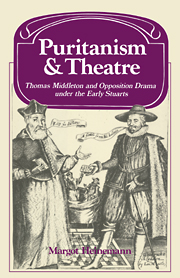Book contents
- Frontmatter
- Contents
- Introductory note
- 1 Time and Place
- 2 Puritanism, Censorship and Opposition to the Theatre
- 3 Middleton as Satirical Journalist
- 4 Early Satirical Comedies
- 5 How Anti-Puritan are Middleton's City Comedies?
- 6 Money and Morals in Middleton's City Comedies
- 7 Middle Years: Tragi-comedy and Moral Comedy
- 8 City Employments
- 9 Hard Times and Hengist, King of Kent
- 10 Political Satire: A Game at Chess
- 11 City Tragedy
- 12 Drama and Opposition, 1619–1640
- 13 From Popular Drama to Leveller Style: a Postscript
- Appendices
- Index
13 - From Popular Drama to Leveller Style: a Postscript
Published online by Cambridge University Press: 03 November 2009
- Frontmatter
- Contents
- Introductory note
- 1 Time and Place
- 2 Puritanism, Censorship and Opposition to the Theatre
- 3 Middleton as Satirical Journalist
- 4 Early Satirical Comedies
- 5 How Anti-Puritan are Middleton's City Comedies?
- 6 Money and Morals in Middleton's City Comedies
- 7 Middle Years: Tragi-comedy and Moral Comedy
- 8 City Employments
- 9 Hard Times and Hengist, King of Kent
- 10 Political Satire: A Game at Chess
- 11 City Tragedy
- 12 Drama and Opposition, 1619–1640
- 13 From Popular Drama to Leveller Style: a Postscript
- Appendices
- Index
Summary
What became of the literary traditions of ‘opposition’ drama after the closing of the London theatres? Clearly they did not continue either in the exiled Royalist theatre at Oxford or in the occasional surreptitious performances put on in the private houses of the nobility during the interregnum. The audiences and their interests were there too different: Fletcher, not Shakespeare, Jonson or Middleton, was the Cavaliers' favourite dramatist.
But while suppression of the public playhouses crushed the old drama out of existence, the printing presses in the 1640s worked with a freedom and range unknown before. Among the thousands of tracts and pamphlets issued in those years and preserved in the Thomason collection, above all in the radical news-sheets, mani-festoes and pamphlets of the Leveller movement, the tradition of popular secular critical writing appears in a new and increasingly confident form. Leveller rhetoric intensifies the strengths of common speech. It is packed with proverbs and colloquial sayings, using concrete and sometimes coarse images from everyday plebeian life for vividness and wit. It is rhythmic, energetic and irreverent, as well as weighty and dignified when occasion requires.
One of the main influences on Leveller style was of course the Bible – the only book many of the rank and file will have known well – and the plain preaching based on it. I want to suggest that some of the most effective writers were also inspired by the other great source of instruction and culture that had been open to ordinary Londoners: the theatres and the published texts of their plays.
- Type
- Chapter
- Information
- Puritanism and Theatre , pp. 237 - 257Publisher: Cambridge University PressPrint publication year: 1980



